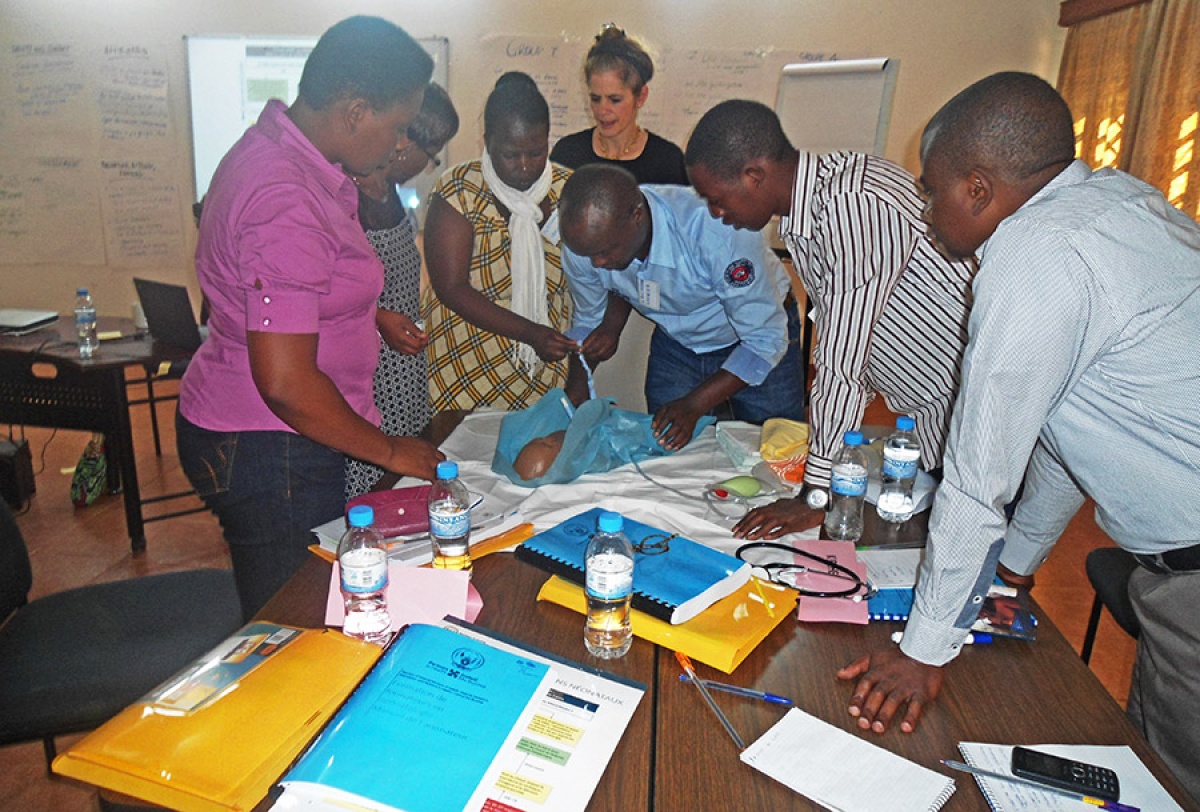Training in Rwanda Focuses on Newborn Care
Posted on Jun 2, 2015

Doctors and nurses from across Rwanda gathered at Rwinkwavu District Hospital this spring, aiming to walk away with an understanding of the country’s new neonatal care package.
One nurse and one doctor from each of Rwanda’s 43 district hospitals and three referral hospitals participated in the training. Rwanda’s Ministry of Health and Inshuti Mu Buzima, Partners In Health’s Rwandan sister organization, organized the training. Boston Children’s Hospital and the Rwanda Family Health Project also partnered on the project.
“This is part of a broader national effort to improve the health and survival of small and sick newborns,” said Dr. Hema Magge, director of pediatrics at PIH/IMB.
The training is a product of the ongoing partnership between Rwanda’s Ministry of Health and PIH/IMB. Ministry officials asked PIH/IMB to help develop national clinical guidelines and protocols for caring for sick newborns in 2010. Clinicians created evidence-based guidelines and field-tested them in Rwinkwavu, a PIH/IMB-supported Ministry of Health hospital, Magge said. The Ministry of Health adopted the initial guidelines in 2011.
“The quality of care being provided is variable across the country, so the goal is to standardize and harmonize the care,” Magge said.
In 2014, PIH/IMB began leading the process to update the protocol and create a more harmonized approach to newborn health by broadening the package to include training materials, medical records, and quality indicators, based on years of field testing.
The curriculum and training team at PIH/IMB helped develop the materials using a “training of trainers” format, in which participants learn both technical skills and teaching skills so they can return to their home districts and train others. The five-day interactive program includes sessions on teaching methodology and clinical protocols, as well as practical, hands-on experience.
Rwinkwavu District Hospital leaders welcomed the participants into their new neonatal unit, which opened in September 2014, for practical bedside teaching.
PIH/IMB surveyed participants daily and at the end of the training. The feedback was largely positive, Curriculum and Training Specialist Suzannah Ellis Johnston said.
“The training went very well,” one clinician wrote. “Please continue this initiative as it will help us to save lives and prevent neonatal death.”
Another pledged to share the information back home: “We thank you for this training and we promise you that we will bring the knowledge we learned to others.”
One challenge is making the training relevant across settings. Some clinicians at the training come from hospitals that don’t have a neonatal unit at all, Magge said, and must refer all sick or underweight infants elsewhere. Others work at hospitals with established units and have more experience with these babies. For those with little experience, key components of the training have been stabilizing and resuscitating newborns, thermal regulation, infection control and prevention, and respiratory support.
But the training moved beyond a purely medical focus. Sessions also focused on problem solving, critical thinking, and task prioritization, as well as interpersonal skills such as how to break bad news to families. Clinicians were eager to develop their skills, Magge said, noting that many stayed late of their own accord to continue learning. That passion is encouraging, she said.
“The goal is that these trainers will continue to be champions of newborn health,” Magge said.
The Ministry of Health and PIH/IMB will follow up on the training by encouraging participants to organize district-level trainings on the neonatal care package. They’ll also monitor whether health facilities create quality improvement initiatives.

